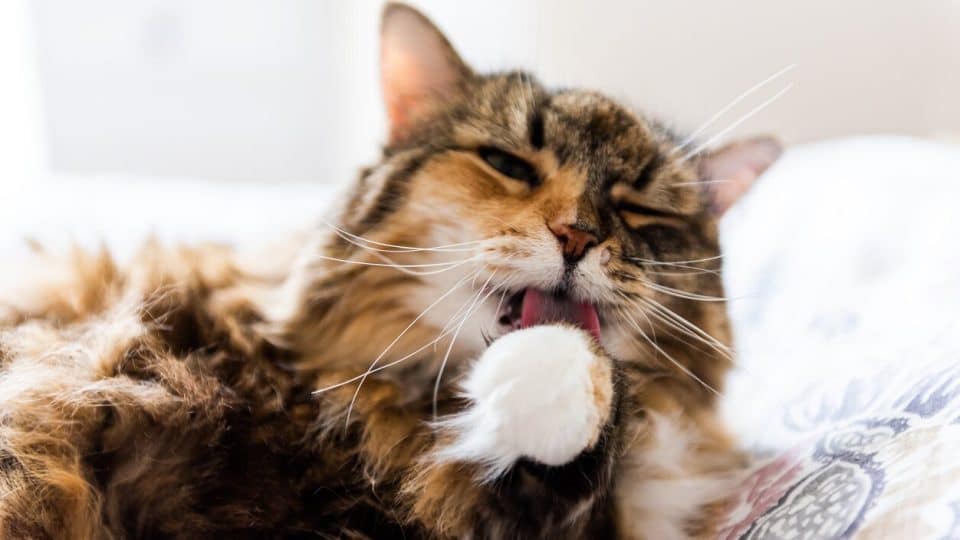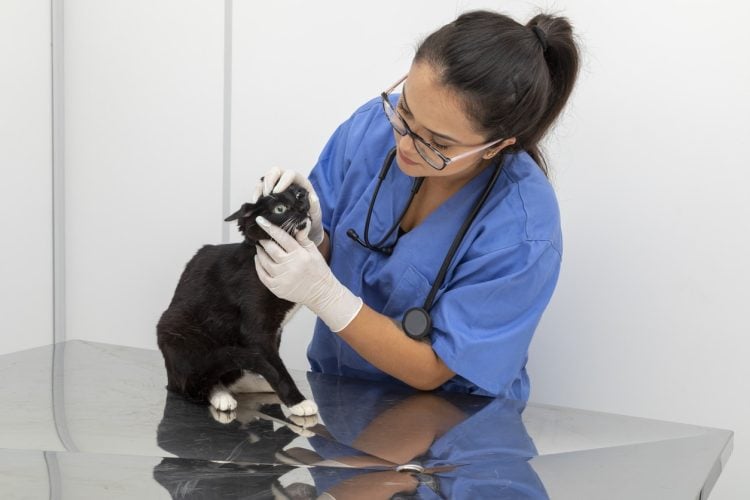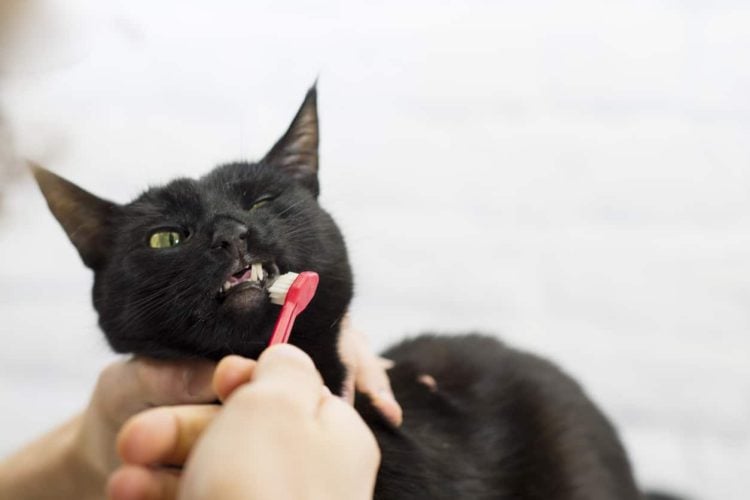Sores in your cat’s mouth, especially along their gums, are most likely caused by a condition called feline chronic gingivostomatitis (FCGS), also known as feline stomatitis. These sores may also appear in the back of their mouth and inside their cheeks.
“Feline stomatitis is a cat’s overactive immune response to tartar or plaque that causes inflammation of the gum tissue in the mouth,” says Meaghan Thomas, DVM, veterinarian at East Ridge Animal Hospital. This condition is serious, but it’s fairly uncommon. Only about 3% of all cat oral health concerns relate to feline stomatitis.
Dr Thomas adds that this condition is difficult to treat and diagnose because it can have many different causes. Without a proper diagnosis of the specific cause, FCGS will likely keep coming back. “Finding the underlying problem is key in treatment,” Dr Thomas emphasises.
Taking your cat to the vet as soon as you notice the signs of mouth sores can help them get the care they need.
How to Know When Your Cat Has Mouth Sores
If your cat has mouth sores, you can often see them clearly when they open their mouth. But certain changes in their behaviour may also point to mouth sores.
You can often recognise cat mouth sores and ulcers by the following signs:
- a bright red colour
- bleeding in the area
- patches that resemble cobblestones in your cat’s mouth, especially along their gums, cheeks, tongue, back of their mouth, or around their teeth
You may also notice your cat:
- paws at their mouth
- drools (often with blood-tinged saliva)
- has swollen gums or lymph nodes
- has bad breath
How to tell if your cat has mouth ulcers through their behaviour
Because these sores are very painful, they can make it difficult for your cat to eat. They can also change your cat’s vocalisations—the way they make sounds, in other words.
Paying attention to these changes in your cat’s behaviour could help you recognise mouth sores:
- crying out when opening their mouths or eating
- approaching their food bowl and running away
- decreased grooming
- depression, which may show up as increased hiding or withdrawal
- dropping food from their mouth
- weight loss
- hissing or other signs of aggression if you try to touch their mouth
Types of cat mouth sores
Cats can have two different types of FCGS. Both cause mouth ulcers, though these sores may develop in different areas of the mouth.
- Type 1: this type, often called simply ‘feline stomatitis’, begins with inflammation around the gums and the tissues surrounding the teeth. You may notice sores on your cat’s inner lips and cheeks. This type is generally easier to treat.
- Type 2: this type, also called ‘caudal stomatitis’, can be more challenging to treat. It involves sores that develop at the fauces. This is the back of the mouth where your cat’s upper and lower jaws come together.
What Causes Cat Mouth Sores?
Experts have yet to determine exactly what causes cat mouth sores.
According to current theories, this condition may develop when your cat’s immune system overreacts to bacteria in dental plaque or common bacteria and viruses, such as:
- Bartonella
- calicivirus
- herpesvirus
- feline leukaemia virus (FeLV)
- feline immunodeficiency virus (FIV)
Diagnosing Cat Mouth Sores
Diagnosing inflammatory conditions like FCGS is often challenging, in part because the signs and symptoms may match up with other health conditions.
Before your vet can diagnose this condition, they’ll likely try to rule out other oral health issues. According to Dr Thomas, other possible causes of sores in your cat’s mouth include:
- caustic stomatitis
- uremic stomatitis
- gum infection
- other dental problems like root fragments
- mouth cancer
- feline viruses like FeLV and FIV
What to expect from your vet
Your vet will likely use some or all of these tests to help diagnose your cat’s mouth sores:
- Complete baseline blood panel. Blood tests can’t diagnose FCGS, but they can rule out other diseases.
- Physical exam. If your cat is in pain, your vet will give them an anaesthetic to avoid distressing them further with the exam.
- Testing for other feline viruses. Your vet will want to rule out conditions like FeLV and FIV.
- Dental X-rays. These can help identify signs of periodontal disease, tooth root resorption, or retained root remnants—any of which can also cause oral inflammation.
- Biopsy of the affected tissue. This can help rule out oral cancer or an infection in the area.
How to Treat Cat Mouth Sores
In many cases, FCGS can improve with treatment, but it’s a complex disease. It won’t go away on its own, and it doesn’t have one specific treatment.
Finding an effective treatment approach may take some trial and error, since the cause of the sores may not always be clear.
Your vet may recommend a combination of treatment options, and your cat will likely need ongoing treatment to manage pain and inflammation.
Dental surgery
FCGS is a painful and uncomfortable condition.
For many cats with FCGS, removing most or all of their molar and premolar teeth, along with the inflamed tissue, can offer relief from their pain. In some cases, your vet may recommend a complete dental extraction.
In one older study involving 30 cats, 24 of them (80%) showed significant improvement within a year or two after the dental extraction. For some of the cats, extraction cured the condition.
Medication
Your vet may also prescribe medication to treat your cat’s mouth sores, though the specific drug they prescribe will depend on the underlying cause and the severity of your cat’s symptoms.
They may suggest:
- medications to relieve your cat’s pain
- short-term antibiotics to manage infections causing the mouth sores
- steroids like prednisone to control inflammation (though these become less effective over time)
- immunosuppressive medications to help manage your cat’s immune system response
- cyclosporine to reduce inflammation
Generally speaking, the most effective treatment involves recognising FCGS early on and having dental extractions done before the condition gets worse. After the extraction, your vet may prescribe steroids.
Regular dental care can also play an important role in both helping prevent this condition and keeping it from getting worse. You can be proactive with your cat’s dental care by brushing their teeth and offering dental treats.
How to Know When Treatment Hasn’t Worked
Your vet will always work hard to find an effective treatment and give your cat the best outcome possible. Still, they may not always find it possible to cure FCGS.
Because this condition can cause a lot of pain, it can have a major impact on your cat’s quality of life. If they struggle to eat and experience constant pain, your vet may explain that euthanasia is the only real treatment.
As a pet parent, making the decision to say goodbye to your beloved pet is extremely difficult, to say the very least. But sometimes, it’s the only way to relieve their distress. Your vet can always offer more guidance with considering your cat’s quality of life and deciding when euthanasia may be the right step.





